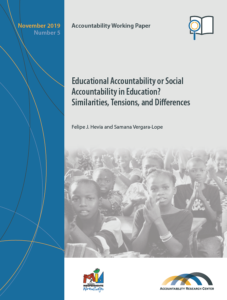Overview
Civil society and social movements have played an outsized role in advancing the goal of Education For All. But there has been little analysis of what they have achieved or how. Recent social accountability efforts have focused on critical scrutiny and monitoring of teachers and student performance. They have often overlooked the structural problems facing public education systems, including under-resourcing, lack of investment, and policy incoherence.
ARC’s work on education aims to help fill this gap through action-oriented research with partners in education policy and practice. In a context of closing civic space, this work is crucial in convincing governments and policymakers to bolster support for social movements, NGOs, civic coalitions, and teacher unions, strengthening their advocacy for fairer and more effective education policies. Civil society actors can also learn from better documentation and analysis of their role in education policy and practice.

Children waiting in line in a school in Sierra Leone.
Credit: GPE/Stephan Bachenheimer (CC 2.0 licence)
Accountability for Education: the Role of Civil Society in National Policy
From 2022-2024 ARC was a global learning partner for Education Out Loud (EOL). This civil society funding program of the Global Partnership for Education is the world’s biggest fund for education advocacy. During 2023, our role as EOL global learning partner was to generate evidence of the role of civil society in advocating for equitable, inclusive, and properly-resourced national education policy, and holding governments accountable for its implementation. We also supported knowledge exchange between civil society actors, creating space for them to reflect on their own strategies.
This action research project aimed to learn from and with civic actors in the education sector. It was co-constructed by civil society education advocacy stakeholders, answering their questions and generating learning that they need. It was led by ARC’s Abrehet Gebremedhin and Naomi Hossain, working with Joy Aceron and Felipe Hevia.
Joy Aceron’s contribution was informed by her advisory role with Multiply-Ed, a youth-led accountability coalition for education in the Philippines. Felipe Hevia’s contribution was informed by his leadership of Medición Independiente de Aprendizajes (MIA, Independent Learning Measurement), and his participation in the People’s Action Learning Network.
Outputs of this project include:
- “Civil society and national education policy: a literature review.” (Abrehet Gebremedhin, Felipe Hevia, and Naomi Hossain, 2023)
- “The role of civil society in national education policy in the global South: an annotated bibliography.” (Madeline Martinez, 2023)
- “The role of civil society in national education policy in the global South.” (Accountability Brief, Abrehet Gebremedhin and Naomi Hossain, 2024)
- “Rethinking reform: the role of teachers’ unions in education advocacy in Zimbabwe.” (Accountability Brief, Abrehet Gebremedhin and Clemence Tauya Nhliziyo, 2024)
-
“Nepal: Civil Society Advances Education Funding Through Tax Justice and Debt Relief Advocacy” (GPE blog, Suchi Pande)
- “Bangladesh’s New Generation of Youth-Led Education Civil Society: Prospects for Reinvigorating Education Reform” (Accountability Brief, Naomi Hossain and Rafansul Hoque, 2024)
ARC Publications on Education
Educational accountability or social accountability in education?
As a concept and an approach, ‘accountability’ has a mixed reputation in the education policy world. Some policymakers believe in the need to hold schools and teachers accountable for educational outcomes through standardized assessment, which they believe will motivate improvement. But this kind of educational accountability can ignore the fact that many actors are involved in making sure children learn in schools. A broader approach to social accountability for education involves firstly, generating better and broader criteria for evaluating education policy; secondly, identifying responsibilities for education and the sources of inequality in systems; and thirdly, involving citizens more substantively in the policy process. A 2019 ARC Working Paper explores these issues and tensions.
Educational Accountability or Social Accountability in Education? Similarities, Tensions, and Differences (Felipe J. Hevia and Samana Vergara-Lope, 2019)
¿Accountability Educativo o Accountability Social en educación? Semejanzas, tensiones y diferencias (Felipe J. Hevia and Samana Vergara-Lope, 2019)

Sandwich strategies in the education sector
Champions of education reform have reached for ‘sandwich strategies’. These are interactive processes in which reformers in government take tangible measures that reduce the risks and costs of citizen action from below. This can drive virtuous circles of mutual empowerment between pro-accountability actors in state and society. Sometimes, it leads to governance reforms and long-term change. ARC’s sandwich strategies project includes three case studies focused on education.
- Opening from Above Meets Mobilization from Below in Monitoring the Ogun State Home-Grown School Feeding Program (Oladeji Olaore, 2022). The Home Grown School Feeding Program in Ogun state was part of the national Social Investment Programme in Nigeria, launched in 2016. The Ogun state government, encouraged by the MacArthur Foundation, enabled a coalition of four CSOs to monitor the operations of an in-school, locally sourced free school meal program operations.
- ‘Constructive Accountability’: Sandwich Strategy for Textbook Delivery in the Philippines (Joy Aceron, 2022). Textbook Count was a partnership between senior officials in the Philippines Department of Education and national CSOs, with donor support. The goal was to prevent corruption and increase efficiency in the purchasing, production, and distribution of textbook. This was achieved by enabling CSOs to monitor each link in the textbook supply chain.
- Collaboration and Contestation: State Actors and MST Activists Reforming Rural Education (Rebecca Tarlau, 2022). The Landless Workers Movement (MST) in Brazil has long struggled for the right to free, rural-oriented education for all living in agrarian reform settlements. This has been a struggle for both access and control. The MST has been able to participate in the co-governance of a parallel rural education system at both the federal level and in within some states.
Complaints systems and social audits in education
ARC’s growing body of work on participatory oversight institutions looks across many public services – including education. A literature review on citizen participation in complaints systems and social audits includes evidence on education. A blog focuses in on complaints systems in education, concluding that they “are not only a matter of technical design and information flows but also about power relations. Citizens should be empowered to make complaints regarding public agents, and those agents should, in turn, be empowered to respond appropriately.”
Grievance Redress Mechanisms in the Public Sector: A Literature Review (Suchi Pande and Naomi Hossain, 2022)
Towards Effective and Inclusive Grievance Redress Mechanisms in Education Systems (Suchi Pande, 2022)
Evaluating Education Out Loud
Abrehet Gebremedhin has conducted two independent evaluations of Education Out Loud, informing the future implementation and design of the program.
Mid-Term Review of Education Out Loud (Cowan Coventry and Abrehet Gebremedhin, 2022)
Examen à mi-parcours du programme Éducation à voix haute (Cowan Coventry et Abrehet Gebremedhin, 2022)
Rapid Review of Education Out Loud’s Operational Component 1 (Abrehet Gebremedhin, 2021)
Revisión rápida del Componente Operativo 1 de Educación en Voz Alta (Abrehet Gebremedhin, 2021)
